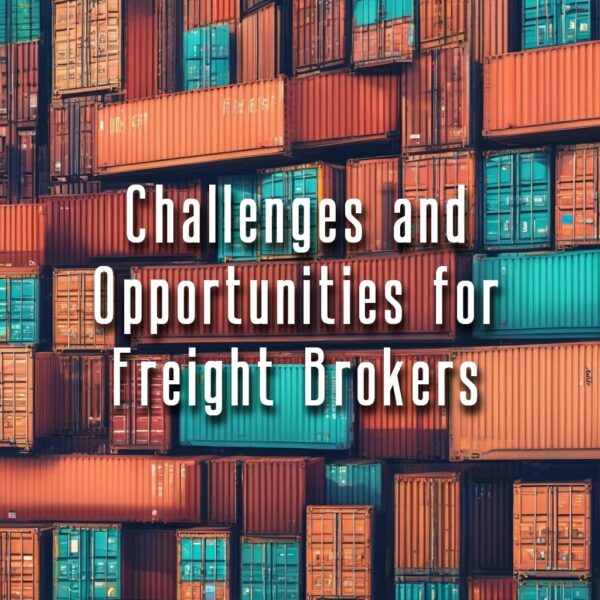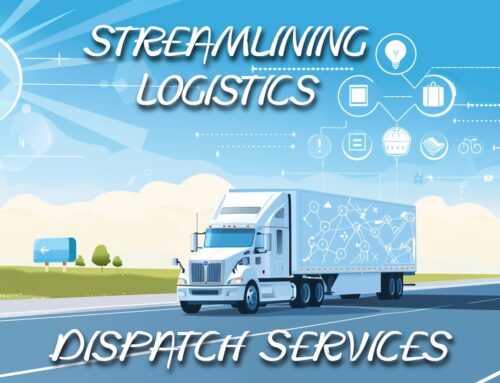Table of Contents
Imagine a bustling marketplace teeming with activity. On one side, businesses of all sizes have a constant stream of products – furniture from factories, clothes from distributors, maybe even fresh produce from farms – all needing to travel hundreds or even thousands of miles to reach their final destinations (shippers). On the other side, a network of trucking companies stands ready, their powerful rigs and trailers the perfect muscle for hauling these goods (carriers).
But connecting these two sides isn’t always straightforward. Businesses might not have the time or expertise to find reliable trucking companies that can handle their specific cargo, navigate complex regulations, and offer competitive rates. Similarly, trucking companies might struggle to find a consistent flow of shipments that keep their trucks on the road and maximize their earning potential.
This is where freight brokers step in, acting as essential intermediaries in the ever-churning engine of the trucking industry. They’re the go-between that bridges the gap between shippers and carriers. Brokers possess a deep understanding of the freight market, constantly tracking the ever-shifting prices for shipping goods (freight rates). They consider various factors that can impact these rates, like the distance a shipment needs to travel, the weight and dimensions of the cargo (is it a lightweight box of clothes or a bulky piece of machinery?), and even the type of product itself (perishables require special handling compared to dry goods).
Armed with this knowledge, freight brokers work tirelessly to find the best possible deals for both parties involved. They negotiate with shippers to secure fair and reasonable rates for their products, ensuring they don’t overpay for transportation. For carriers, brokers strive to find loads that match their trucks’ capabilities and keep them running efficiently. This way, carriers can maximize their profits and avoid costly empty miles. Ultimately, freight brokers play a crucial role in keeping the flow of goods moving smoothly across vast distances, ensuring a well-oiled and efficient transportation system.
Broker Charges and Straightforward Communication
 Figuring out how much brokers earn on each shipment can be a head-scratcher. Some brokers operate on a commission basis, typically taking a slice of the pie (around 10-20%) of the total shipping cost. Others might offer more predictable pricing by charging a flat fee per mile.
Figuring out how much brokers earn on each shipment can be a head-scratcher. Some brokers operate on a commission basis, typically taking a slice of the pie (around 10-20%) of the total shipping cost. Others might offer more predictable pricing by charging a flat fee per mile.
Commission Power
Some brokers operate on a commission system, essentially taking a percentage of the total shipping cost (typically ranging from 10% to 20%). This approach can be advantageous for shippers with high-value cargo, as the broker’s incentive aligns with securing the best possible rate. A higher overall cost translates to a higher commission for the broker, motivating them to negotiate aggressively on behalf of the shipper. However, for smaller shipments, a commission might feel like a larger chunk out of a tighter budget.
Flat Rate Fairness
Other brokers prefer a more straightforward approach with flat fees charged per mile. This method offers predictability for both shippers and carriers. Shippers can easily factor in the broker’s fee when budgeting for the entire shipment, while carriers know exactly how much they’ll earn per mile hauled. This upfront transparency simplifies the process and allows both parties to focus on the core task – getting the goods delivered efficiently.
Transparency is Key
Regardless of the specific pricing structure, clear communication remains paramount. Reputable brokers will be upfront and honest about their fees, explaining how they’re calculated in a clear and easy-to-understand manner. They’ll readily answer questions from both shippers and carriers, ensuring everyone involved has a full understanding of the cost breakdown. This transparency fosters trust and builds strong working relationships within the freight transportation network. A shipper with a clear grasp of the broker’s fees can make informed decisions about their budget, while a carrier who understands the compensation structure can confidently accept or decline a shipment based on profitability. Open communication benefits everyone in the long run, contributing to a smoother and more efficient flow of goods across the vast network of the trucking industry.
Challenges and Opportunities for Freight Brokers
 The trucking industry is a dynamic beast, constantly in flux as market conditions shift. These changes present both challenges and opportunities for those who navigate this complex ecosystem. Freight brokers, the essential matchmakers connecting shippers with carriers, are no exception. Here, we’ll explore some of the current headwinds facing brokers and strategies they can employ to ensure continued success.
The trucking industry is a dynamic beast, constantly in flux as market conditions shift. These changes present both challenges and opportunities for those who navigate this complex ecosystem. Freight brokers, the essential matchmakers connecting shippers with carriers, are no exception. Here, we’ll explore some of the current headwinds facing brokers and strategies they can employ to ensure continued success.
The Shrinking Gap Between Contract and Spot Rates
Contract rates have traditionally provided stability for both shippers and carriers. These fixed prices applied to regular shipments, offering a reliable foundation for budgeting. Spot rates, on the other hand, fluctuated based on real-time market demands, typically used for one-off hauls. However, recent events like the COVID-19 pandemic significantly impacted supply chains and freight demand. This disruption has narrowed the gap between contract and spot rates.
For brokers, this presents a problem. With contract rates becoming more aligned with spot rates, their leverage in rate negotiation weakens. The previously available buffer zone, where brokers could negotiate a margin between the two rates, has shrunk. This squeeze on profit margins necessitates reevaluation of traditional business models for some brokers.
Strategies for Continued Trucking Success
The evolving landscape doesn’t spell doom and gloom for freight brokers. It simply demands a proactive approach and a willingness to adapt. Here are some potential strategies brokers can explore:
- Specialization: Focusing on specific niches within the market, such as temperature-controlled goods or oversized cargo, allows brokers to develop deeper expertise and offer specialized services that command premium rates.
- Technology Adoption: Embracing technology like digital freight matching platforms and data analytics tools can streamline operations, increase efficiency, and potentially reduce overhead costs.
- Value-Added Services: Expanding beyond basic load matching by offering additional services like shipment tracking, route optimization, and insurance procurement can add value for clients and justify higher fees.
- Building Strong Relationships: Cultivating long-term partnerships with both shippers and carriers fosters trust and loyalty. This can lead to repeat business and potentially more flexible negotiation terms.
By acknowledging the challenges and proactively implementing these or similar strategies, freight brokers can navigate the shifting landscape and continue to play a vital role in the efficient flow of goods within the trucking industry.
How These Changes Impact Truckers
 These changes have the potential to send ripples through the trucking industry, affecting trucking companies in a few ways. Smaller brokers, particularly those struggling to maintain quality service while keeping costs under control, could face difficulties staying afloat in this evolving landscape. Additionally, some brokers might resort to pressuring carriers to accept lower spot rates to maintain their own profitability. This scenario could lead to a race to the bottom, potentially hurting carrier income and creating an unsustainable environment for all parties involved.
These changes have the potential to send ripples through the trucking industry, affecting trucking companies in a few ways. Smaller brokers, particularly those struggling to maintain quality service while keeping costs under control, could face difficulties staying afloat in this evolving landscape. Additionally, some brokers might resort to pressuring carriers to accept lower spot rates to maintain their own profitability. This scenario could lead to a race to the bottom, potentially hurting carrier income and creating an unsustainable environment for all parties involved.
Strained Survival for Smaller Brokers
Smaller brokers, already grappling with maintaining high-quality service while balancing cost pressures, may find themselves especially vulnerable in this evolving environment. The shrinking buffer zone between contract and spot rates could limit their negotiation power, making it challenging to secure profits while offering competitive rates to both shippers and carriers. This financial squeeze could threaten the viability of some smaller players in the brokerage market, potentially leading to a consolidation within the industry. With fewer brokers competing for business, this consolidation could reduce overall choice and potentially lead to less flexibility for both shippers and carriers in the long run.
Pressures on Carrier Income and Safety
In a bid to maintain their own profitability amidst tighter margins, some brokers might resort to pressuring carriers to accept lower spot rates. This could trigger a downward spiral, with carriers forced to accept diminishing returns to keep their trucks running. This race to the bottom could have serious consequences for carrier income, potentially leading to financial strain and impacting trucker livelihoods. Furthermore, pressured to cut costs, carriers might prioritize short-term savings over essential maintenance or safety measures. This could lead to an increase in breakdowns and accidents on the road, jeopardizing the safety of drivers and the public alike.
Unsustainable Ecosystem and Declining Efficiency
If both brokers and carriers struggle financially due to shrinking margins, the entire freight transportation ecosystem could suffer. Carriers squeezed on rates might prioritize lower costs over safety or proper truck maintenance, jeopardizing safety standards on the road. Reduced profitability for brokers could also lead to a decline in service quality. Brokers facing financial constraints might struggle to invest in the latest technology or maintain a robust network of qualified carriers. This decline in service quality could negatively impact efficiency and reliability within the entire system, potentially leading to delays and disruptions in the movement of goods across the country.
The Need for Proactive Adaptation
To navigate these challenges effectively, all participants in the trucking industry – brokers, carriers, and shippers alike – need to embrace a spirit of adaptation. Exploring alternative business models, fostering stronger partnerships built on trust and transparency, and potentially even collaborating to find mutually beneficial solutions are all crucial steps towards ensuring a sustainable and healthy freight transportation ecosystem. For example, shippers could consider exploring long-term contracts with reliable carriers to secure stable pricing and capacity, while carriers could look into niche specializations to command premium rates. Brokers, on the other hand, could focus on developing value-added services like shipment tracking and route optimization to justify higher fees. By working together and embracing innovation, all stakeholders within the trucking industry can navigate these changing dynamics and ensure the continued smooth flow of goods across the nation’s highways.
Building Trust in a Changing Marketplace
 In this dynamic marketplace, both shippers and carriers benefit from working with brokers who prioritize transparency. Open communication regarding fees and practices is crucial. Shippers want to ensure they’re paying fair rates, while carriers deserve fair compensation for their services. Transparency fosters trust and strengthens the vital partnerships within the freight transportation ecosystem.
In this dynamic marketplace, both shippers and carriers benefit from working with brokers who prioritize transparency. Open communication regarding fees and practices is crucial. Shippers want to ensure they’re paying fair rates, while carriers deserve fair compensation for their services. Transparency fosters trust and strengthens the vital partnerships within the freight transportation ecosystem.
Shippers Seeking Fairness
Shippers naturally want to ensure they’re not being overcharged for transportation services. Working with transparent brokers allows them to gain a full understanding of the fee structure and the breakdown of costs associated with each shipment. This knowledge empowers them to make informed decisions with confidence that they’re receiving a fair deal.
Carriers Deserving Fair Compensation
Carriers, the backbone of the trucking industry, deserve to be paid a fair rate for their services. Transparent brokers ensure carriers understand the details of each shipment, including the agreed-upon rates and any associated fees. This clarity eliminates confusion and fosters trust, allowing carriers to make informed decisions about accepting or declining loads based on profitability.
Building Bridges and Strengthening Partnerships
Open communication regarding fees and practices forms the foundation for strong and trusting relationships within the freight transportation ecosystem. When all parties involved – shippers, carriers, and brokers – operate with transparency, it fosters a sense of collaboration and mutual respect. This, in turn, strengthens partnerships and contributes to a more efficient and reliable flow of goods across the country.
The Benefits of Open Communication
Here are some of the advantages of prioritizing transparency in the freight brokerage industry:
- Reduced Disputes: Clear communication regarding fees and expectations helps to minimize misunderstandings and potential disagreements between shippers, carriers, and brokers.
- Enhanced Efficiency: When everyone involved has a clear understanding of their roles and responsibilities, the entire shipping process becomes more streamlined and efficient.
- Long-Term Partnerships: Transparency fosters trust, which is essential for building long-term, mutually beneficial partnerships within the industry. These strong relationships translate to a more reliable and predictable shipping experience for all parties involved.
By prioritizing clear communication and open dialogue, freight brokers can position themselves as trusted partners in the ever-changing marketplace. This commitment to transparency can serve as a guiding light, helping to navigate the changing dynamics of the industry and ensuring a more efficient and sustainable freight transportation ecosystem for everyone.
Knowledge is Your Key to Higher Profits
By equipping themselves with a clear understanding of how freight brokerage works and staying informed about current trends, truckers gain a significant advantage. Resources and information are readily available to help truckers find reputable brokers and negotiate fair rates. Asking questions, comparing options, and making informed decisions are key to securing profitable hauls and navigating the ever-changing landscape of the trucking industry.
The trucking industry thrives on a foundation of knowledge. By staying informed and making strategic decisions, truckers can empower their businesses to not only survive but flourish in the competitive landscape. Knowledge is truly the key that unlocks success in this dynamic environment.
Additional Tips for Truckers:
- Build strong relationships: Developing positive relationships with reputable brokers can lead to consistent work and potentially better rates.
- Embrace technology: Utilize tools and resources like online load boards and route planning software to find efficient routes and maximize profits.
- Stay compliant with regulations: Ensure your trucking company adheres to all industry regulations to avoid fines and delays.
By following these tips and staying informed, truckers can position themselves for success in the ever-evolving world of freight transportation.
The Bottom Line: Maximize Profits

The world of freight transportation can be complex, but with the right knowledge and partnerships, truckers can navigate the challenges and secure profitable hauls. Here at AFT Dispatch, we understand the unique needs of small trucking companies and owner-operators.
AFT Dispatch: Your Trusted Partner for Increased Revenue
Our established truck dispatch service is designed to empower you to maximize your earning potential. Here’s how AFT Dispatch can benefit your semi-truck operation:
- Expert Rate Negotiation: Our experienced dispatchers leverage their industry expertise to negotiate top dollar rates on your behalf. This ensures you get paid what your services are worth, maximizing your profit per mile.
- Reduced Empty Miles: We prioritize finding efficient routes that minimize empty miles and keep your trucks on the road generating income. Every mile driven translates to potential earnings, and AFT Dispatch helps you maximize those miles.
- Consistent Loads: Finding consistent freight can be time-consuming. AFT Dispatch takes that burden off your shoulders, connecting you with a steady stream of profitable loads that keep your trucks busy and your income flowing.
Stop Wasting Time and Start Earning More
Don’t let the complexities of the freight industry hold you back from achieving financial success. AFT Dispatch can be your one-stop shop for maximizing your earning potential.
Ready to Take Control of Your Income?
Let AFT Dispatch connect you with high-paying loads, negotiate top rates, and streamline your operations. Fill out our quick and easy opt-in form today and see how much AFT Dispatch can help your trucking business thrive!
Still have questions? Our team of experts is always happy to chat! Feel free to call or text us at (801) 448-6363. We also offer a vast library of free educational trucking videos on our website. Don’t miss out on valuable tips and insights that can help you succeed in the ever-evolving world of trucking.






Leave A Comment